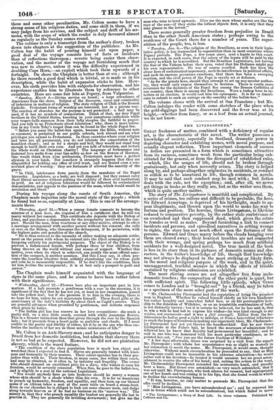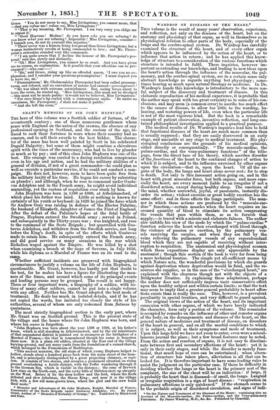THE LIVINGSTONES. 5 GREAT freshness of matter, combined with a deficiency
of regular art, is the characteristic of this novel. The writer possesses a knowledge of society, especially in Scotland, dramatic power in depicting character and exhibiting scenes, with moral purpose, and soundly elegant reflection. These important elements of success in fiction are presented in a form which is sometimes attractive from its raciness, sometimes weak from the particular being sub- stituted for the general, or from the disregard of established rules, —which, like the usages of life, should not be broken through gratuitously, but only when necessity arises.TlAe story is helped along by, and perhaps altogether originates in aCeigOts, or conduct so selfish as to, be unnatural in life, though common in novels. It may be said that such conduct may be met with ; but fiction deals with the rule, not the exception; and, after all, we never get things in hOoks as they really are, but as the writer sees them, which is quite another matter. The story of The Livingstones is manifold and complicated. By a series of crimes, too callous and difficult to be probable, the hero, Sir Edward .A.rmytage, is depiived of his birthright, made to ap- pear illegitimate, and thrown upon the world to make his way to fortune and position. The heroine, Grace Livingstone, is likewise reduced to comparative poverty, by the rather stale contrivance of an overlooked and then suppressed deed, which gives the estate to females as well as males. Beyond furnishing a link to connect incidents.and persons, and episodical narratives in setting wrongs to rights, the story has not much effect upon the fortunes of the persons. Edward and Grace marry before the clouds hanging over them are cleared away ; their heaviest troubles are not connected with their wrongs, and spring perhaps too much from artificial accidents for a well-designed novel. The true merit of the book is less in its story than in its pictures of domestic scenes and cha- racters, in the writer's knowledge of life, though that knowledge may not always be displayed in the most striking or likely form, in the moral and religious purpose of the work, and in the quiet, unexaggerated, truthful manner in which the effects of trouble sustained by religious submission are exhibited. The more stirring scenes are not altogether free from mele- dramatic touches; the composition of the other parts is quiet, but with sufficient spirit. The following little e ipsode, whten Grace comes to London and is " brought out" by a friend, may *taken as a specimen of the more sober part of the work.
" Mr. Cholmondeley Pierrepoint had the reputation of being the proudest man in England. Whether he valued himself chiefly on his own handsome but rather haughty and somewhat faded face, or on his presumptive heir- ship to the dukedom of Wiltshire, or on an irresistible combination of both, is not distinctly known ; but it is certain he believed, for he has said it, that to win a wife he had but to express his wishes—he was kind enough to say woke; not commands—and it was a fait accompli. Either from the fas- tidiousness he had so good a right to indulge, or from a benevolent reluctance to crush the hopes of hundreds in making one supremely blest, Mr. Cholmonde- ley Pierrepoint had not yet thrown the handkerchief. But he saw Grace lAymg,stone at the Palace ball, he heard the murmurs of admiration that followed her, he knew that Royalty had pronounced her beautiful ; and be said to one who was honoured with his most particular confidence, as he pointed her out, ' How you see the future Duchess of Wiltshire.' " A few days afterwards, Grace was surprised by a visit from the superb Mr. Pierrepomt ; with whom her acquaintance was so slight as scarcely in her estimation to merit the name. Mr. Pierrepoint, it would seem, thought otherwise. Without much circumlocution he proceeded to say, that as Miss Livingstone could not be insensible to his extreme admiration—he would rather call it his devotion—he trusted it would. occasion her no great aston- ishment to receive the offer of his hand ; and suiting the action to the word, Mr. Cholmondeley Pierrepoint extended his aristocratic hand, and proudly bent a knee. But Grace was astonished—so very much astonished, that it was not until Mr. Pierrepoint, who took silence for consent, had appropriated one of her hands and was raising it to his lips, that she found words in which to decline the overwhelming honour. "It was, however, no easy matter to persuade Mr. Pierrepoint that the offer could be declined.
"'Miss Livingstone, you have misunderstood me' ; and he renewed his suit in terms which could not be misunderstood, but which failed to move
* The Livingstones; a Story of Beal Life. In three volumes. Published by
Colburn and Co. •
Grace. ' You do not mean to say, Miss Livingstone, you cannot mean, that —that you refuse me! refuse me, Miss Livingstone ! ' That is my meaning, Mr. Pierrepoint. I am very sorry you oblige me to repeat it.' " Good Heavens ! Madam ! do you know who you are refusing ? do you know what you are refusing? Impossible ! Miss Livingstone, consider— I beseech you, do not do yourself this injustice.'
"There never was a human being less proud than Grace Livingstone, but a woman instinctively revolts at being commanded to love ; and Mr. Pierre- point's entreaties sounded very like commands. "I am quite aware that I decline the honour of Mr. Pierrepoint's pro- posal,' said she, slowly and distinctly. " 'Oh ! Miss Livingstone, you cannot be so cruel. And you have given me no reason, no explanation. Is it possible that your affections can be pre- engaged ?—who " 'Sir, said Grace, rising up like an offended queen, 'I owe you no ex- planation, and I consider your questions presumptuous ! I must request you to leave me, sir.'
"Presumptuous! Mr. Cholmondeley Pierrepoint had been called presump- tuous, and refused, and no convulsion of nature had ensued—presumptuous !
"He was silent with extreme astonishment. But, seeing Grace about to leave the room, he started up. 'Miss Livingstone, this must not be divulged —this must not be made public : it would not be believed, Miss Livingstone.'
"For once Grace's lip curled with a contemptuous smile. Be under no uneasiness, Mr. Pierrepoint ; I shalt not make it public.'
"And she left the room."



























 Previous page
Previous page